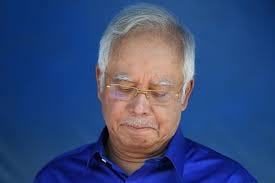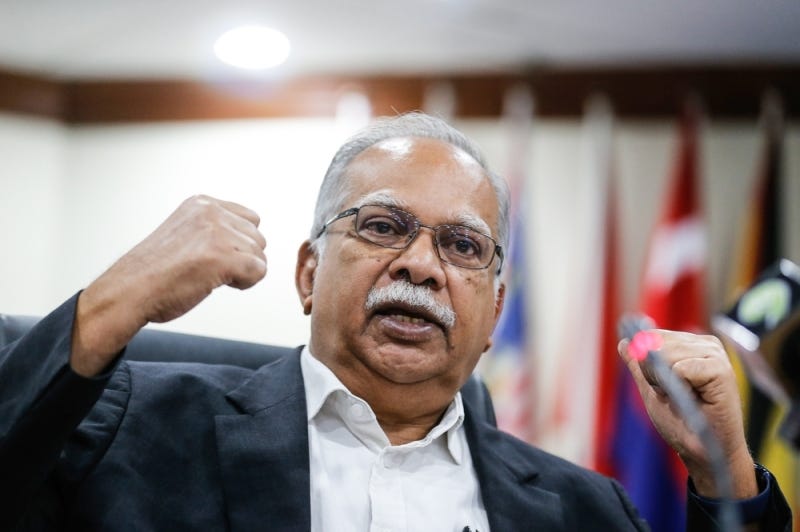Guest Post:The case for Najib’s full royal pardon: Need for political courage
Prof. Dr. Ramasamy
Comment: The current YDPA before he became YDPA expressed something similar. There is growing support for this view throughout some circles.
The case for Najib’s full royal pardon: Need for political courage
In 2018, Prime Minister Anwar Ibrahim was pardoned by the Agong upon the recommendation of the then Pakatan Harapan (PH) government. Anwar was convicted and imprisoned for certain charges.
Similarly, I believe that former prime minister Najib Razak deserves a full royal pardon from the current Agong.
The government, through the Pardons Board, must move decisively beyond the partial pardon Najib has received and unequivocally seek his full pardon.
A full pardon would not erase Najib’s conviction or incarceration but would acknowledge the complex political dynamics surrounding his case.
If certain leaders in UMNO could have their corruption and money laundering charges dropped to preserve the present grand coalition, why shouldn’t Najib, the son of Malaysia’s “father of development,” Tun Abdul Razak, also benefit from the same political pragmatism?
The withdrawal of charges and the discharge not amounting to acquittal (DNAA) for Deputy Prime Minister and UMNO President Ahmad Zahid Hamidi was driven by the necessity to maintain the stability of the PH-BN unity government.
UMNO’s parliamentary support was crucial, and political considerations took precedence over judicial outcomes.
In contrast, Najib was prosecuted with unprecedented vigor by the PH-led government under Tun Dr. Mahathir Mohamad after losing power in 2018. It was Anwar who commented recently about how the prosecution was rushed during this period.
While crimes were undoubtedly committed, the intensity of his prosecution was amplified by political vengeance.
The selective nature of these actions raises questions about fairness, especially when Zahid himself later escaped conviction through political maneuvering.
Despite UMNO’s participation in the unity government, Zahid failed to champion a full pardon for Najib. Preoccupied with his own legal battles, Zahid lacked the courage and resolve to demand Najib’s release, even though he had the leverage to do so.
Had Zahid threatened to withdraw UMNO’s support for the government, Najib might have been free by now.
Anwar Ibrahim’s leadership on this issue has also been disappointing. While the government plays an advisory role in the Pardons Board under the Constitution, Anwar’s refusal to take a firm stand has exposed him as a leader unwilling to tackle politically sensitive matters head-on.
His ambiguous stance regarding the royal addendum on Najib’s house arrest further undermines his credibility.
The upcoming pro-Najib rally on January 6, 2025, supported by BN component parties such as MCA and MIC, reflects the growing demand for Najib’s full pardon.
UMNO’s alignment with PAS on this issue highlights the deep dissatisfaction within Malay political circles. This movement is more than a call for Najib’s release—it signifies a potential shift in Malaysia’s political landscape.
If Najib’s release is delayed further, the political ramifications could be profound. The unity government, led by PKR and DAP, may find itself sidelined as public frustration grows.
Zahid’s inability to act decisively could also hasten his exit from UMNO, paving the way for new leadership.
Ultimately, the Agong must consider the well-being of the rakyat. Najib’s full pardon could be the catalyst for broader political changes that better align with the aspirations of the Malay majority.
The movement to free Najib is gaining momentum, and it may herald the replacement of the current Madani government with a coalition more attuned to the nation’s shifting political dynamics.
Who knows—like Mahathir, Najib might even return as Malaysia’s prime minister for a second term. As for Anwar, as the Malay proverb goes, “Sepandai-pandai tupai melompat, akhirnya jatuh ke tanah juga” (No matter how clever the squirrel, it will eventually fall to the ground).
Leaders must ultimately face the consequences of their actions, and Anwar’s inaction on this issue could be his undoing.
The views expressed are those of the writer
Prof. Dr. P Ramasamy
Malaysian, 75 years of age. Former professor of political economy UKM. Former Senior Research Fellow, ISEAS. Former Visiting Professor, University Kassel, Germany. Deputy Chief Minister Penang, 2008-2023. Former member of parliament, 2008-2013. Three terms Perai state assemblyman. Former Chairman of Penang Hindu Endowments Board. Involved in peace talks in Aceh and Sri Lanka. International peace consultant. Chairman of political party Urimai.
Subscribe Below:





It's strange that in the name of politics, crimes have become acceptable. Political expediency seems to have rights to trample blatant crimes committed. A criminal is a criminal no matter who he is. Please don't conflate justice with politics! It's insulting when people try to paint Najib or ZH or for that matter any criminal as a victim of political shenanigans. The victims are us - the rakyat. The very people these criminals say they represent. A real shame.🫣
Has the author lost his mind? This is not just a Malaysian issue, the world is watching. Think the 1MDB scandal can't get any worse? Dr. Ramasamy is suggesting the Agong engage in a "Hold my beer" moment, to demonstrate to the world how idiotic Malaysia can be.
At home this will be the same a throwing down the gauntlet of pubic decorum. Malaysians are reluctant to express public disapproval especially when it may run afoul of what the racial and religious warlords want. However, a Najib pardon will tip the balance. Restraint will disappear. Civil disobedience will skyrocket and the charade of social harmony will evaporate.
No. Pardoning Najib is a bad idea no matter how politically astute it may seem to those desperately clinging to power. You want to see courage? Ask the Agong to make it clear that Najib will stay in prison. That the imaginary house arrest decree is just that--imaginary.
The Malay royalty commands respect in Malaysia. It's time for the current Agong to think of the country first, since it is clear that politicians are only thinking of themselves.